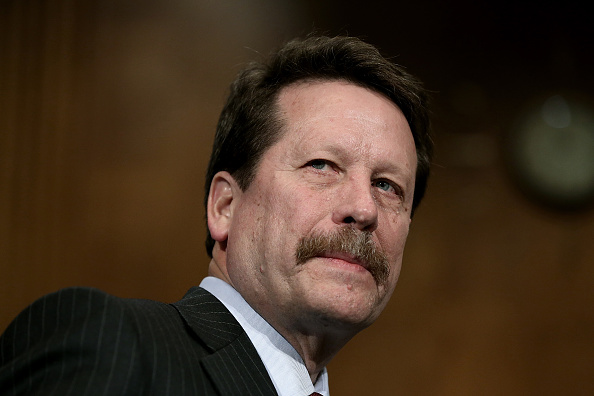President Joe Biden’s nomination of Robert Califf for commissioner of the Food and Drug Administration (FDA) faces uncertainty as several members of the U.S. Senate oppose his appointment.
Califf got through his nomination hearing before the Senate Health, Education, Labor and Pensions (HELP) committee with little trouble on December 14 but HELP must vote on the nomination, scheduled for January 12, and it is uncertain when the full Senate will vote on his appointment.
Any delay provides Califf’s opponents additional time to rally support for their bid to defeat the nomination. Califf formerly served in the position briefly—less than a year—during the Obama administration.
Democrats Opposed
Califf’s nomination faces potential bipartisan opposition, mostly due to his close ties to the pharmaceutical industry.
Senators Joe Manchin (D- WV), Richard Blumenthal (D-CT), and Ed Markey (D-MA) opposed his nomination in 2016, and Manchin and Blumenthal have stated they do not support the current nomination. Manchin explained concerns he had about Califf’s ties to the pharmaceutical industry and its role in the opioid epidemic, in a statement on November 12.
“Dr. Califf’s nomination makes no sense as the opioid epidemic continues to wreak havoc on families across this country with no end in sight,” said Manchin. “2020 was the deadliest year on record for drug-related overdose deaths with 1,386 West Virginians and nearly 95,000 Americans dying from a drug-related overdose. I have made it abundantly clear that correcting the culture at the FDA is critical to changing the tide of the opioid epidemic.”
Califf’s Big Pharma Profits
During the 2016 confirmation process, a disclosure statement on the website of Duke Clinical Research Institute revealed Califf had received money from 23 drug companies, including such giants as Johnson & Johnson, Lilly, Merck, Schering Plough, and GSK.
Medical website Medscape disclosed at the time Califf had “served as a director, officer, partner, employee, advisor, consultant or trustee for Genentech.” Portola Pharmaceuticals also disclosed that Califf served on its board of directors prior to being tapped to helm the FDA.
A disclosure statement for a 2013 article in Circulation by Califf also lists financial links to Gambro, Regeneron, Gilead, AstraZeneca, Roche, and other companies and equity positions in four medical companies.
Consulting ‘A Very Good Thing’
Califf has also drawn criticism for a statement made in an interview with National Public Radio defending collaboration between the pharmaceutical industry and federal regulators.
“Many of us consult with the pharmaceutical industry, which I think is a very good thing.” Califf said. “They need ideas and then the decision about what they do is really up to the person who is funding the study.”
Califf also controversially defended the drug Vioxx, which was blamed for some 50,000 heart attacks before its eventual withdrawal.
Industry Lauds Nomination
Industry organizations are pleased with the nomination. AdvaMed, the world’s largest trade organization representing medical technology companies, released a statement of support for the nomination, as did Michael R. Minogue, the chairman, president, and CEO of Abiomed.
“I welcome the nomination of Commissioner Califf to serve again as FDA Commissioner,” said Minogue. “I have enjoyed working with him over the years, and I look forward to working together again to strengthen our public-private partnership with FDA, as the agency and our companies work toward our common goal of bringing safe, effective medical technologies into the hands of patients and their doctors.”
Califf’s Priorities
A top question is whether Califf is independent enough to reform the agency’s bureaucratic drug approval process, says Edward Hudgins, founder of the Human Achievement Alliance and a former senior fellow at The Heartland Institute, which co-publishes Health Care News.
“When he was a professor at Duke University, he urged major pharmaceutical companies to do larger, expensive, and often more time-consuming clinical trials in order to secure FDA certification for their new treatments,” said Hudgins.
“Both Duke and Califf personally profited from those trials,” said Hudgins. “He did not seem to appreciate fully that such trials often meant years of delays getting new products to patients, leaving thousands to suffer and even die.”
FDA Reforms Needed
The FDA needs to move more quickly to approve the growing list of promising new drugs and treatments, says Hudgins.
“The FDA needs to be nimbler, in light of the advances in exponential technologies, genetic engineering, and artificial intelligence, along with our growing understanding of ailments like Alzheimer’s and even the aging process itself that such advances could treat,” said Hudgins.
“Certifying treatment breakthroughs from such advances using the FDA clinical trials paradigm will be forcing a square peg in a round hole,” said Hudgins. “We can ask about Califf’s willingness to transcend the current certification system to accommodate those advances, which his pharma friends could see as a threat to an old regulatory process in which they’ve invested a lot of time and from which Califf has profited.
“Will he back reforms like the bipartisan Promising Pathways Act (S-1644, HR-3761) now before Congress, which would create an innovative parallel track on which patient can access safe treatments still begin tested for efficacy and generate real-world data that could cut many years and billions of dollars of the certification process?”
Kevin Stone (kevin.s.stone@gmail.com) writes from Arlington, Texas.
Internet info:
Edward Hudgins, “A Modern System for Approving the Cures of the Future,” The Heartland Institute, April 2019.
